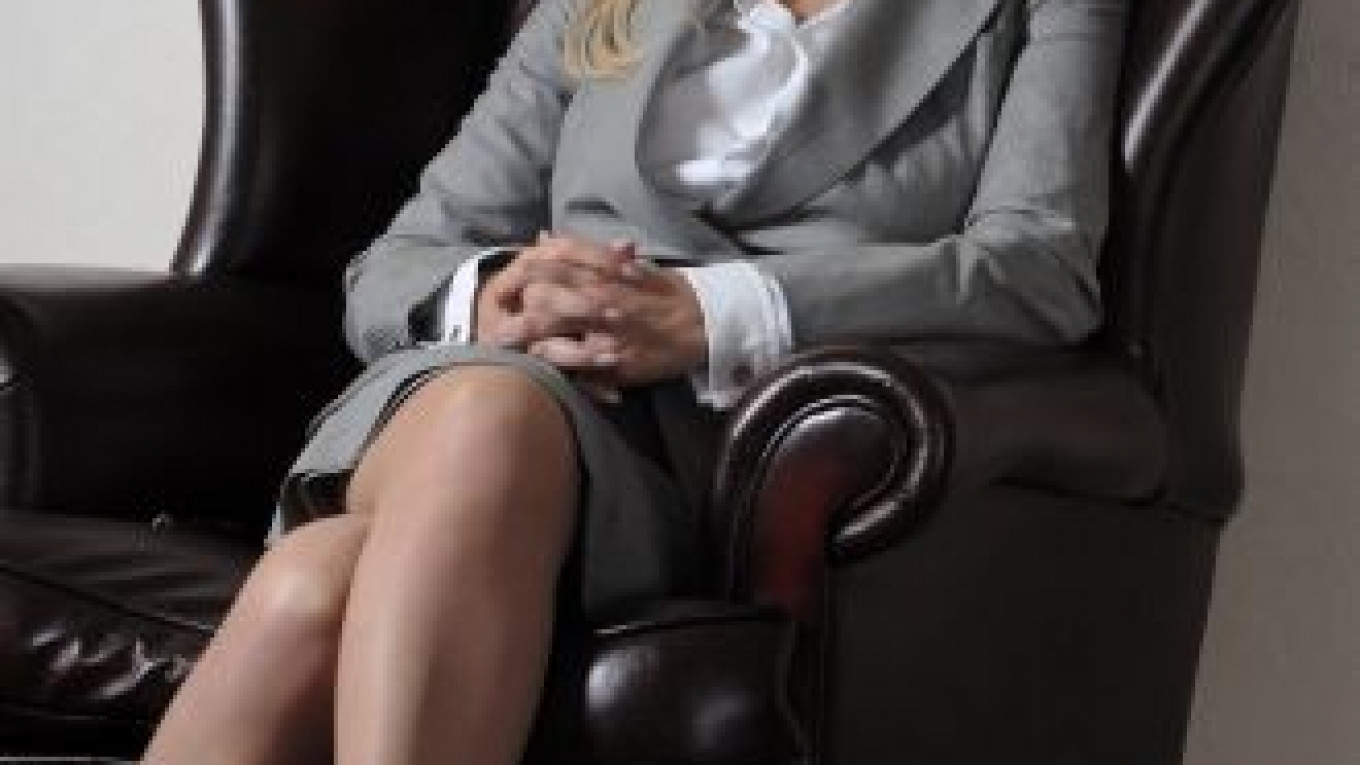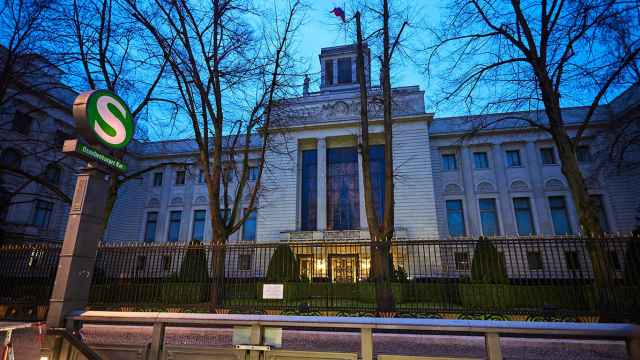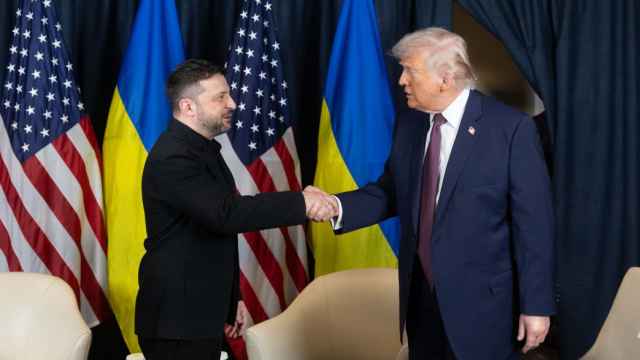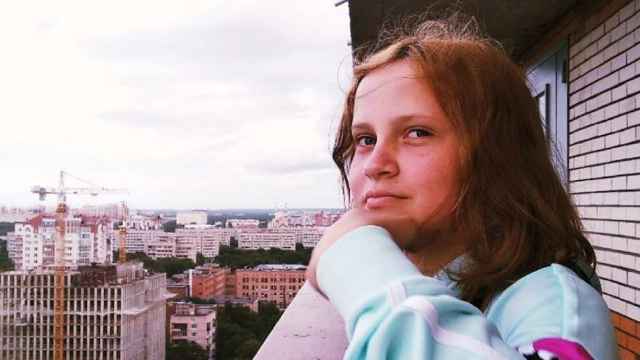WASHINGTON — Five years after fleeing Moscow amid allegations of financial machinations, New York real estate mogul and socialite Janna Bullock is ensnared in a global tug-of-war with Russia over assets she is accused of stealing to fund her jet-set lifestyle.
In an unprecedented development in a complex Russian corruption scandal intertwined with the opaque world of offshore finance, the lending arm of Russia's state-owned energy giant Gazprom during the past year has convinced a court in Cyprus to freeze Bullock's assets worldwide, according to court filings in the U.S. and Cyprus.
The ruling has been echoed by similar injunctions ordered in France and the British Virgin Islands, a Caribbean offshore tax haven, against assets Bullock is alleged to control, according to documents filed in U.S. and British Virgin Island courts.
The asset freezes, details of which emerged earlier this year in little-noticed Cypriot and U.S. litigation involving Bullock, come as Gazprombank seeks to recover $21 million in damages that it claims to have suffered due to purported fraud by Bullock and her associates.
The bank accuses Bullock, 46, of embezzling money from government-owned companies that it invested in and using the funds to purchase a $20 million yacht, an expensive London apartment and hotels in Courchevel, France, a posh ski resort popular among wealthy Russians.
Bullock has launched a counteroffensive in U.S. federal court, where she has called the Cyprus case part of a conspiracy by her former Russian business associates to rob her of "hundreds of millions of dollars" by plundering the business empire that she built in and around Moscow.
The standoff coincides with intensified efforts by Russian authorities to prosecute Bullock's former associates on allegations of large-scale fraud — individuals who include her ex-husband Alexei Kuznetsov, a former senior official in the government of the Moscow Region.
Kuznetsov was detained by French police on an Interpol warrant in July and now faces extradition to Russia. His tenure as the region's chief of finance from 2000 to 2008 coincided with Bullock's ascent as a real estate developer, art collector and high-society fixture in New York City.
Russian authorities have accused the reportedly now divorced couple and their associates of stealing hundreds of millions of dollars from the regional government.
Several of these associates have already been convicted or indicted in Russia on charges related to theft of funds from the region's coffers, and the Investigative Committee said in November that an international warrant had been issued for the arrest of Bullock herself.
Bullock, who was born in Soviet Belarus, emigrated to the U.S. in the early 1990s and later married Kuznetsov, a Russian banker with whom she has a daughter. Bullock embarked on a real estate career nearly a decade ago, setting up companies in both the U.S. and Russia and splitting time between the two countries. She made her name by snapping up and reselling multimillion-dollar homes in New York City, while at the same time conducting lucrative business with government-owned companies that Kuznetsov oversaw and was instrumental in capitalizing with public funds.
During this period, Bullock climbed New York's social ladder, becoming a party-circuit staple and ultimately a trustee of the Guggenheim Museum, which noted in its 2007 announcement of her election that she had amassed "more than 4,000 works by Russian artists from the late 19th century to the present day" as well as "400 works by Western contemporary artists."
She stepped down from the Guggenheim board in 2010 as corruption allegations against her began emanating westward from Russia.
Both Kuznetsov and Bullock left Russia in 2008 after Russian authorities announced a probe into whether companies tied to Bullock's firm, RIGroup, illegally obtained real estate in the Moscow region, home to some of the country's priciest real estate. Bullock told The New York Times in 2010 that at one point her company was worth $2 billion.
Numerous large and small investors in the Moscow region-owned companies that Kuznetsov and Bullock have been accused of looting have turned to Russian courts to recoup their losses.
But the freezing order issued by Cyprus appears to be the first known instance of a foreign court agreeing with Russia's assertion that investors have an arguable claim against the pair.
Frozen Assets
Together with an obscure Cypriot company called Gorsoan Limited, which it has enlisted to pursue litigation, Gazprombank filed an August 2012 lawsuit in Cyprus against Kuznetsov, Bullock and a dozen companies that she owns or allegedly controls.
The plaintiffs allege that Bullock and her associates embezzled money from Moscow region-owned companies that were overseen by Kuznetsov in which Gazprombank invested $20 million through a series of bond issues between 2005 and 2008.
The bank claims that it was burned when the companies were allegedly hollowed out by Bullock and her associates and left unable to repay the debt. In a ruling on Aug. 14, 2012, Cyprus' District Court of Limassol ordered a temporary global asset freeze against Bullock, as well as against companies that she owns and is alleged to control.
Bullock and the 12 companies filed a joint objection, but the court rejected the appeal in a March 6 ruling and left the injunction in place, saying Gazprombank had a reasonable chance to win the lawsuit.
The injunction freezes the defendants' worldwide assets up to $26.3 million and orders them to disclose all of their assets exceeding 10 million euros ($13.2 million), Marcos Dracos, an attorney representing Gazprombank and Gorsoan in the Cyprus action, said in a March 15 declaration to the U.S. District Court for the Southern District of New York.
Bullock's attorney in the Cyprus case, Achilleas Demetriades, is also representing the 12 companies in the case and declined to comment when contacted.
"The client will make no comment on the pending litigation," Demetriades said in an e-mail.
Bullock did not respond to an e-mail seeking comment on numerous details in this story, and the telephone number listed on her website appears not to be in service. Her attorneys in New York did not return messages left at their respective offices.
Contacted repeatedly by e-mail and telephone in recent weeks, Gazprombank also declined to comment on the litigation.
In a separate decision, the Eastern Caribbean Supreme Court on Aug. 17, 2012, granted a request by Gazprombank and Gorsoan, ordering a global freeze of assets up to $26.3 million against three companies registered in the British Virgin Islands that are named as defendants in the Cyprus case.
Gazprombank accuses the three companies — Alcork Limited, Hitnell Limited and Elmwood Ventures — of receiving funds allegedly embezzled from the Moscow region-owned companies that it invested in.
Additionally, a French court has recognized the Cypriot-ordered asset freeze, attorneys for Gorsoan and Gazprombank employee Vitaly Sirotkin said in a March 15 memorandum filed in the U.S. District Court for the Southern District of New York.
A French court-ordered asset freeze against Bullock, Kuznetsov or other defendants in the Cyprus case could not be independently confirmed in time for publication.
Gorsoan and Sirotkin are defendants in a U.S lawsuit filed by Bullock in which she accuses Sirotkin of being paid off to submit "false testimony and forged documents" to the Cypriot court.
That lawsuit was dismissed in June by the U.S. District Court for the Southern District of New York after the judge determined that the court was not the proper forum for the action. Bullock's attorneys have appealed that decision with the U.S. Court of Appeals for the 2nd Circuit.
A Yacht and a Duke
In a lengthy affidavit filed in the Cyprus case by Sirotkin, who describes himself as a Gazprombank employee specializing in "problem assets," he alleges that Bullock is the likely beneficiary of Elmwood Ventures, one of the three companies listed in the British Virgin Island-ordered asset freeze, and suggests that all three firms may be controlled by the same person or entity.
A British Virgin Island-registered company called Elmwood Ventures is the owner of a Cayman Islands-flagged yacht called "MY Tzarina," Sirotkin alleges, citing information from the Cayman Islands Shipping Registry. In his affidavit, he proceeds to describe a dizzying series of transactions through offshore firms that allegedly funneled illicit funds to Elmwood for purchase of the $20.5 million yacht in October 2006.
In the affidavit, Sirotkin cites evidence that he says was disclosed in Russian criminal proceedings by U.S. citizen Dmitry Kotlyarenko, a former board chairman of Bullock's RIGroup Russia, who was convicted of large-scale fraud in Russia.
In an April 2010 blog post, the luxury lifestyle publication Haute Living touted the ship interior's planned futuristic design.
"With this ship, the proud owner, a Russian real estate developer, is dictating a new paradigm in the world of yacht design," Haute Living wrote, though it did not specifically name Bullock as the owner of the vessel.
As of early September, a photograph on the website of Swiss-born architect Michelangelo Macchi appears to show Bullock and Kotlyarenko sitting with MY Tzarina's designers. The photograph, located in Macchi's portfolio, is described as "Design Team with the Owner."
Kotlyarenko, a 33-year-old graduate of Cornell University in New York, was sentenced to three years in prison in June 2011 after admitting to participating in a criminal scheme to steal more than 1 billion rubles from a Moscow region-owned company during Kuznetsov's time in the government there, according to Russian prosecutors.
He was detained in Cyprus on an Interpol warrant in March 2009 and subsequently extradited to Russia. His Russian prison sentence appears to have already been completed. Russian authorities say Kotlyarenko's whereabouts are currently unknown and that he is wanted in connection with the same alleged crimes that Bullock is accused of committing.
Meanwhile, Hitnell Limited, another of the British Virgin Island-registered companies named in the Cypriot and British Virgin Island freezing orders, used money from the Russian bond offers — via a purported loan from Bullock's RIGroup Russia — to buy a £3.8 million ($7.3 million) London home in November 2006, Sirotkin alleges.
Public records show that Hitnell purchased the property from Gerald Grosvenor, the Sixth Duke of Westminster and Britain's wealthiest person as of March of this year, according to Forbes.
The property was sold in April 2010 to a British Virgin Island-incorporated company called 12 Eaton Square Limited for the stated price of £20.5 million ($32.8 million), according to the Official Land Registry for London and Wales.
Bullock's attorneys denied in the U.S. lawsuit that her Russian subsidiary loaned money to Hitnell to purchase the London property.
Sirotkin also alleges that RIGroup Russia "in all likelihood" embezzled money from a $40 million Russian bond that it issued in December 2006 and eventually defaulted on. One of the bondholders was a Moscow region-owned company that Gazprombank invested in and which the bank accuses Bullock and Kuznetsov of stealing from.
Sirotkin alleges that money from the RIGroup Russia bond was illegally used to help Bullock acquire hotels in France.
In the U.S. lawsuit, Bullock's attorneys say there was nothing illegal about the purchase of the French hotels and that they were financed by the sale of shares in RIGroup Russia.
RIGroup is the sole shareholder of the French hotel and property company Societe Des Hotels D'Altitude, according to a May 21 French corporate filing signed by Bullock. The company was founded in early 2007 in part to acquire the hotels Pralong and Crystal in Courchevel, according to French corporate records.
RIGroup purchased the two hotels in December 2007, Bullock was cited in the Russian media as saying after the acquisitions.
A January 2008 report by Bullock associate R. Couri Hay on the gossip website New York Social Diary describes the glamorous launch of Bullock's hotel brand, S Club, at a Courchevel soiree that included drivers "dressed in the traditional Russian garb of Cossacks" as well as "a three-story snowman and an enormous ice sculpture, lit from within by flames."
"The serene effect was continued as guests sipped the finest French champagne while gazing out at the beautiful French Alps," Hay wrote.
Keeping the Lights On
Bullock has hardly concealed her taste for the good life since she embarked on a real estate career a decade ago by buying, refurbishing and selling high-end real estate on New York City's Upper East Side.
She said last year, however, that she is "extremely cost conscious with everything I do," according to The New York Times, which noted that she had kept a lower profile in recent years since allegations of financial misdeeds against her began surfacing.
She re-emerged in the spring of last year with an art exhibition needling Russia's political and business elite, which included a portrait of Kuznetsov with the caption: "Catch of the Day."
An asset freeze like the Cyprus injunction against Bullock can force an individual or business to rein in extravagant spending, according to Santiago Cueto, a Florida-based attorney and an expert on international litigation.
"A court will allow reasonable living expenses, but if they go sailing on a yacht for $1 million a week the court will probably say no," Cueto said, adding that businesses are generally allowed to continue operating to avoid a precipitous drop in their value.
The ultimate goal of the sanction is to maintain the value of the assets, pending a court decision on a plaintiff's claim, he said.
"The court would indicate whether they have the right to continue their ordinary business expenses to pay their bills and keep the lights on," Cueto said.
Such an asset freeze extends globally for the targeted individual or company, meaning that they can be held in contempt — and jailed — by the court if they diminish or dissipate their assets anywhere in the world and then return to the country that issued the sanction, he said.
What will happen next in this acrimonious feud remains unclear: Neither Bullock nor her Russian pursuers have shown any sign of backing down.
The New York tycoon, meanwhile, does not appear to be retreating from the global party scene. Haute Living reported on its website last month that she threw a "cowboy party" in the glitzy resort town St. Tropez in the south of France.
MY Tzarina, the yacht Gazprombank contends Bullock owns, is currently undergoing a refit started in 2008 at Balk Shipyard in the Netherlands, according to the shipyard's website.
A Message from The Moscow Times:
Dear readers,
We are facing unprecedented challenges. Russia's Prosecutor General's Office has designated The Moscow Times as an "undesirable" organization, criminalizing our work and putting our staff at risk of prosecution. This follows our earlier unjust labeling as a "foreign agent."
These actions are direct attempts to silence independent journalism in Russia. The authorities claim our work "discredits the decisions of the Russian leadership." We see things differently: we strive to provide accurate, unbiased reporting on Russia.
We, the journalists of The Moscow Times, refuse to be silenced. But to continue our work, we need your help.
Your support, no matter how small, makes a world of difference. If you can, please support us monthly starting from just $2. It's quick to set up, and every contribution makes a significant impact.
By supporting The Moscow Times, you're defending open, independent journalism in the face of repression. Thank you for standing with us.
Remind me later.






